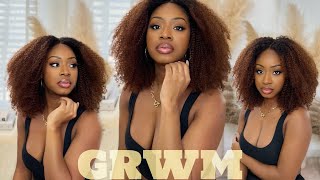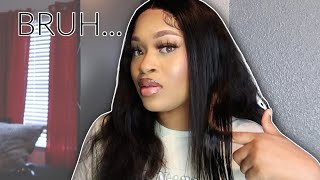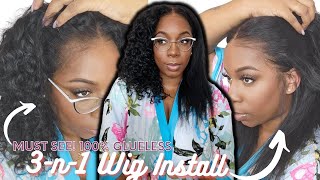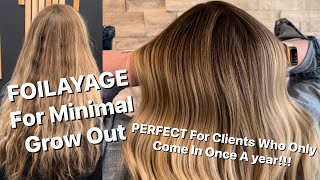Ouidad Claims Oil Does Not Seal In Moisture But We Respectfully Disagree
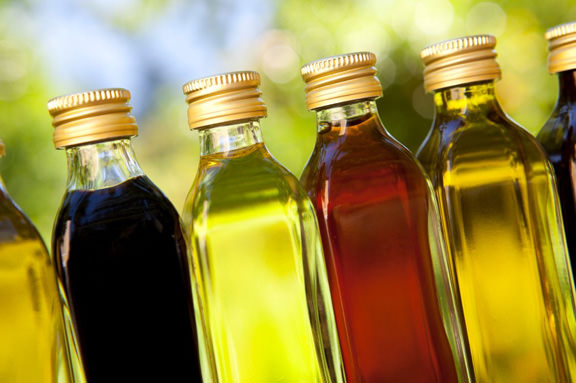
I love a great post, once chalk full of controversy and education with a little bit of funny to hold me as I read. Lord knows we have a million things to look at so it takes alot to keep ones attention for longer than five minutes. Recently though something I read did just that, I literally was reading and watching the video in the post for close to an hour and I plan to share it with you right now.
Here on BHI we support our sisters and brothers in blogging, we follow hundreds of blogs and we sometimes repeat posts with information that needs to be highlighted so that our readers too can voice there opinions.
What I read was a post by Christina Patrice on the popular Blog Black Girl Long Hair, where she was talking about her experience at a Google Hangout hosted Ouidad and Ty Alexander. It was a whole hour of great information talking about frizz and how to manage it, it was expertly titled Frizz 101.
It was a great business move for Ouidad, as a matter of fact if you are in the business of selling and you aren’t interacting with your customers in a real way using tools like Google Hangout and other social media outlets, you are doing your business a great disservice.
At the end of the day we as consumers know that it is a hard sell for products but sometimes some really great relevant information is shared that we can take away with us and apply them to our lives, or in this case our hair regimens.
In watching the video here is where things started to unravel, during the discussion the stylist answered a question about Ouidad’s Shine Hair Glaze. The stylist described the product as an accessory, kind of like lipstick or earrings. Its that product that just adds value to the look of your style but not necessarily the health of your hair, of course she didn’t say that but that’s what I got out of it.
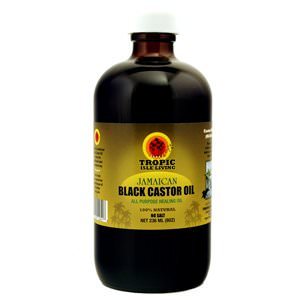 The question was, when in the process of doing your hair should the Shine Hair Glaze product be added? Should it be after we use an oil to seal in the moisture we add to our hair? The stylist responded by saying
The question was, when in the process of doing your hair should the Shine Hair Glaze product be added? Should it be after we use an oil to seal in the moisture we add to our hair? The stylist responded by saying
Ok Oil does not seal in moisture, I wanna cry now, It does not, it does not, it does not… so there, what is does it coats the hair and repels natural moisture to come into it, causing dehydration…
Shock and awe filled the room, oh the horror! Lady did you just curse at me? And my mouth dropped at the indecency of that statement.
OK, maybe that is a bit melodramatic but you get the picture. This is a perfect example of a person saying something that just ruined their credibility after 33 minutes of a perfectly great discussion that just may have sold some products.
In her post Christina described how she went a bit further in her investigation and reached out to another stylist, which was smart, lets get another unbiased opinion, just in case Ouidad was blinded by their glaze or something. To our surprise the stylist said almost the same thing, she said, and we quote below:
Applying a light oil to hair after styling or before bed for daily moisture is great. But it is the IDEA of ‘sealing’ that I have an issue with. You SHOULD have to apply your oil or spray-on moisturizer daily, that means it is truly being absorbed. If you put oil in your hair Sunday and it is still there Wednesday, your hair is lubricated, NOT moisturized. Oil does not “seal” moisture into the hair. If you have to L.O.C., that means your L is a crap product.
Hmmm, *raises hand*, I have a question, what if your L is water? Still crap or naah? Here is why the answer is the same, some stylists and some salons are often very product driven, so her statement is based on the fact that the L must represent a product, when really all it represents is liquid, which can be anything from water to aloe vera juice* to Ouidads most recommended leave in conditioner*.
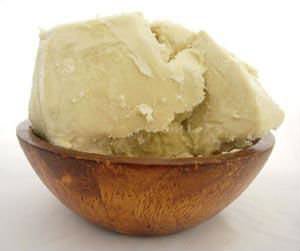 There was also no mention of porosity or does that not even matter as well, lets just throw that out too while we are at it! At this point we could get into some scientific mayhem and just end the whole conversation all together.
There was also no mention of porosity or does that not even matter as well, lets just throw that out too while we are at it! At this point we could get into some scientific mayhem and just end the whole conversation all together.
But The Natural Haven also weighed in and broke it down very nicely on BGLH, and like a perfect pot of soup that needs nothing else, we have nothing to add. We would still like to reiterate some parts of her post though, we liked her response to question 2:
Q2: What does science say on oil and moisture?
A scientific study looked at the effect of applying oil to hair on both moisture retention and moisture pick up from the air (Journal of Cosmetic Science, pp 135-145, 2007). The oils* used were coconut, sunflower and mineral oil*. The 3 key findings were:
– Oil DOES help to prevent moisture loss from the hair fibre. Hair with an oil layer has higher moisture retention compared to uncoated hair.
– Oil DOES have a sealing effect. Hair with an oil layer will take up less water vapour compared to uncoated hair which means that the oil layer slows moisture uptake.Coconut oil allowed more moisture in than mineral oil (i.e mineral oil is a better sealer).
– Oil layers on hair DO NOT prevent hair from taking up water vapour. Although uncoated hair will take up the most water vapour from the air, hair coated with oil (mineral, sunflower or coconut) will also still take up significant amounts of water vapour from the air.
This closely matches the findings of Jeni of JGA’s sealing experiment as shown below. The image is pretty self explanatory…
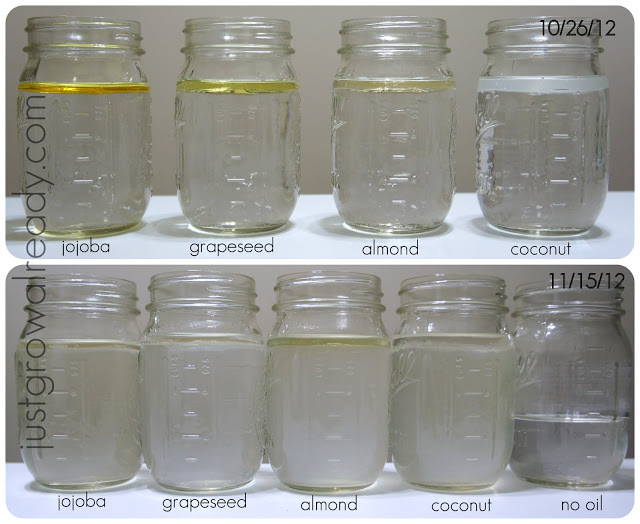
And to question 3:
Q3: What exactly is in the glaze product suggested for shine instead of oil?
The Ouidad shine glaze serum suggested as a final touch for shine contains two silicones (silicones are oils*), alcohol and an emollient (Cyclopentasiloxane, Dimethiconol, Alcohol Denat, C12-15 Alkyl Benzoate). It is pretty much a silicone based serum that will feel less oily due to the emollient. In the grand scheme of water entry prevention to hair, silicones and mineral oil* are top of the table.
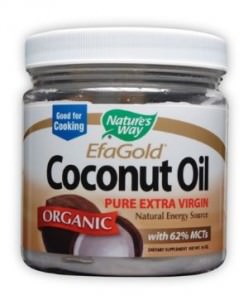 You see you cant get it twisted, silicones are barriers too much like oils* but if you compare a silicone to a pure natural oil, which one will get the big C for crap? We really doubt it will be the oil.
You see you cant get it twisted, silicones are barriers too much like oils* but if you compare a silicone to a pure natural oil, which one will get the big C for crap? We really doubt it will be the oil.
When you have what is considered a well made product, be careful of ingredients like silicones that trick you into believing that your hair is healthy.
There is nothing wrong with a glaze or a shine product or even silicones as long has you know what it is that you are using it for and not have any unrealistic expectations.
Your hair strand unlike a living creature does not need to ‘breath’ in the manner that she mentioned during the Google hangout.
Hair is a fiber, it is dead, so we use products to preserve our strands so that we can retain length. Moisture and oil do just that, they work together to give your hair movement so that it does not dry out and break off like any other fiber would do when subject to heat, a harsh environment or constant manipulation.
On the other hand your scalp and hair follicles are a little different, much of what happens there is driven by our health not to mention our scalp is expertly designed to moisturize itself with sebum, all things remaining equal of course.
When a product company is talking about their products sometimes they can get a bit over zealous and forget about the science behind certain things. The moral of this story is, just take what you can from the conversation and leave behind the rest, buy products because you like them but also because you know everything you need to know about it because it is going on your hair.
Finally the proof is always in the pudding, we have so many women who seal with oils* who have gorgeous healthy waist length hair, so if it ain’t broke.. you know the rest right? So what do you ladies think of their statement?

